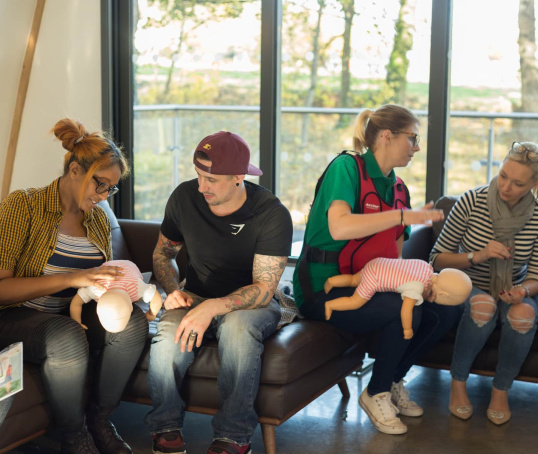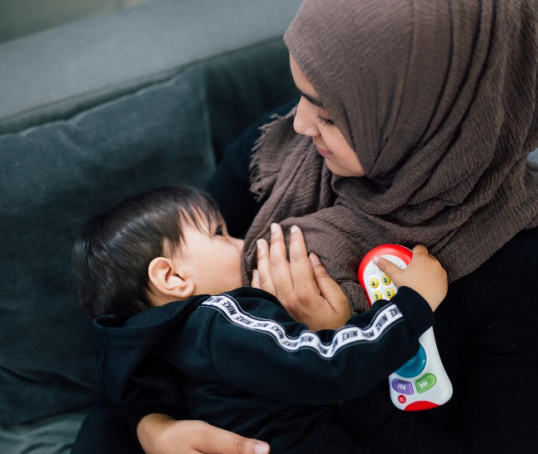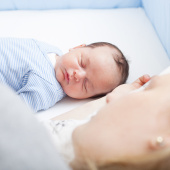It’s understandable that we focus on mums in the postnatal period but let’s not forget the dads and co-parents who also need support.
Whether it’s sleep deprivation, money worries, new responsibilities, or the relationship dynamic shifting, dads also have a lot to take on board. This is a huge life change for both parents. On top of this, dads and co-parents might feel guilty about what their partner is going through, knowing they aren’t the ones breastfeeding at 3am or healing from labour and birth.
Here’s what you need to know about postnatal depression in partners. (Most of the research has been conducted in fathers to date, so while we often refer to dads below, we know it can apply to all types of partners.)
1. Dads and partners can experience depression in the first year after birth
The number of men who become depressed in the first year after becoming a dad is double that of the general population (Davé et al, 2010). Twenty five percent of dads experience mild depressive symptoms (Noorullah et al, 2020) and around 10% to 12% have a diagnosis of depression (Paulson et al, 2010; Philpott and Corcoran, 2018).
First time dads are appear to be more vulnerable to postnatal depression than dads welcoming subsequent children (Fatherhood Institute, 2010).
2. Postnatal depression in men and other partners often goes undiagnosed
The peak time for postnatal depression in men is three to six months after the birth (Fatherhood Institute, 2010).
As with postnatal depression in mums, it often goes undiagnosed. The symptoms can look a lot like the everyday stresses of having a newborn (Musser et al, 2013).
If you have concerns about your own or your partner’s mental health, do seek help from your GP who can help you to access support services.
3. Hormonal changes may play a role
Just as with mums, changes in hormones might make postnatal depression in dads more likely (Saxbe et al, 2017).
Hormones including testosterone, oestrogen, cortisol, vasopressin, and prolactin may change in dads during the period after their babies arrive (Kim and Swain, 2007).
4. Postnatal depression in dads and partners is more likely if the mum has depression too
If one of you is experiencing emotional or mental health difficulties, it's more likely that the other is too. Of fathers with depressed partners, a quarter to half may experience depression themselves (Fatherhood Institute, 2010).
5. A range of factors can make dads and partners more likely to get postnatal depression
Dads who are under 25 are more likely to experience postnatal depression than their older counterparts (Davé et al, 2010).
Yet age isn’t the only risk factor for postnatal depression in men. Other major risk factors include a history of depression and anxiety, financial pressures, and no longer being in a relationship with the child’s mother (Huang and Warner, 2005; Wee et al, 2010; Nazareth, 2011).
Other factors that make postnatal depression in men more likely include: sleeping or crying issues with the baby; drug abuse or dependence; and feeling unsupported by their partners (Huang and Warner, 2005; Fatherhood Institute, 2010; Stadtlander, 2015).
However, the relationship between these factors is unclear so they might not necessarily be the direct cause of mental health difficulties.
6. Postnatal depression in dads and partners can show itself in different ways than in mums
Symptoms can include (Musser et al, 2013; Stadtlander, 2015):
- fear, confusion, helplessness and uncertainty about the future
- withdrawal from family life, work and social situations
- indecisiveness
- frustration, irritability, cynicism and anger
- marital conflict
- partner violence
- negative parenting behaviours
- alcohol and drug use
- insomnia
- physical symptoms like indigestion, changes in appetite and weight, diarrhoea, constipation, headaches, toothaches and nausea.
7. Postnatal depression in dads and partners can take its toll on their relationships
Postnatal depression in dads can affect their relationship with the baby’s mother (Wee et al, 2011; Demontigny et al, 2013). It can also affect the relationship they have with their child. They may play and engage less with their children and talk more negatively about and to them. They may sing and read less to their children, and may discipline them more harshly (Sethna et al, 2015).
8. Postnatal depression in dads and partners can have an impact on the development of their child
Dads’ depression is associated with emotional, social and behavioural problems as well as developmental delay in their children (Fatherhood Institute, 2010).
The association is stronger when a father experiences antenatal as well as postnatal depression, and when his symptoms are particularly severe. There is also a stronger association when the mum also has mental health problems (Stadtlander, 2015).
9. Screening is available
You might associate screening with physical illness but mental health diagnoses are catching up. Men who are concerned about their mental health can use this NHS screening tool (NHS, 2020). Alternatively, if you’re concerned, see your GP or call NHS 111.
10. Postnatal depression in dads and partners is treated the same as postnatal depression in mums
The treatment of paternal postnatal depression is in its early stages. Currently, the options for treatment are the same as for mothers with psychotropic medication and/or talking therapies (Nazareth, 2011; NHS, 2018).
Relationship counselling may also be useful (Musser et al, 2013).
Most, importantly share how you're feeling. You're not alone and support is available.
This page was last reviewed in February 2022.
Further information
We run Partners in Mind, a peer-to-peer support group for dads and partners in the North West. There are lots of videos and online resources to help you manage your mental health, as well as groups so you can meet and talk to other dads. Take a look at their information page here, email parentsinmindnw@nct.org.uk or follow them on Instagram @nctparentsinmindpartners and on Facebook @NCT Parents in Mind.
Our support line offers practical and emotional support in all areas of pregnancy, birth and early parenthood: 0300 330 0700. We also offer antenatal courses that are a great way for both parents to find out more about birth, labour and life with a new baby.
For information and support, visit Fathers Reaching Out run by Mark Williams, campaigner, speaker and writer.
The Campaign Against Living Miserably (CALM) is leading a movement against male suicide, the single biggest killer of men under 45 in the UK.
The Hub of Hope is a national mental health database, bringing help and support together in one place, with a focus on grassroots organisation.
ANDYSMANCLUB is a non judgmental, talking group for men.
DadsNet offers support and knowledge through a community of dads on practical parenting and fatherhood.
Demontigny F, Girard ME, Lacharité C, Dubeau D, Devault A. (2013) Psychosocial factors associated with paternal postnatal depression. J Affect Disord. 150(1):44-49. Available at: https://doi.org/10.1016/j.jad.2013.01.048
Davé S, Petersen I, Sherr L, Nazareth I. (2010) Incidence of maternal and paternal depression in primary care. JAMA Pediatr. 164(11):1038-1044. Available at: https://doi.org/10.1001/archpediatrics.2010.184
Fatherhood Institute. (2010) Research summary: fathers and postnatal depression. Available at: http://www.fatherhoodinstitute.org/2010/fatherhood-institute-research-summary-fathers-and-postnatal-depression [Accessed 26th January 2022]
Huang C, Warner L. (2005) Relationship characteristics and depression among fathers with newborns. Soc Serv Rev. 79(1). Available at: https://doi.org/10.1086/426719
Kim P, Swain J. (2007) Sad dads: paternal postpartum depression. Psychiatry. 4(2):35-47. Available at: https://www.ncbi.nlm.nih.gov/pmc/articles/PMC2922346/ [Accessed 26th January 2022]
Musser A, Ahmed A, Foli K, Coddington J. (2013) Paternal postpartum depression: what health care providers should know. J Paediatr Health Care. 27(6):479-485. Available at: https://doi.org/10.1016/j.pedhc.2012.10.001
Nazareth I. (2011) Should men be screened and treated for postnatal depression? Expert Rev Neurother. 11(1):1-3. Available at: https://doi.org/10.1586/ern.10.183
NHS. (2018) Overview - postnatal depression pages. Available at: https://www.nhs.uk/mental-health/conditions/post-natal-depression/overv… [Accessed 26th January 2022]
NHS. (2020) Depression and anxiety self-assessment. Available at: https://www.nhs.uk/mental-health/self-help/guides-tools-and-activities/… [Accessed 26th January 2022]
Saxbe DE, Schetter CD, Simon CD, Adam EK, Shalowitx MU. (2017) High paternal testosterone may protect against postpartum depressive symptoms in fathers, but confer risk to mothers and children. Horm Behav. 95:103-112. Available at: https://doi.org/10.1016/j.yhbeh.2017.07.014
Sethna V, Murray L, Netsi E, Psychogiou L, Ramchandani PG. (2015) Paternal depression in the postnatal period and early father–infant interactions. Parenting. 15(1):1-8. Available at: https://doi.org/10.1080/15295192.2015.992732
Stadtlander L. (2015) Paternal postnatal depression. Int J Childbirth Educ. 30(2):11-13. Available at: https://search.proquest.com/openview/d4950af74618239aa64b8b53f96d5713/1?pq-origsite=gscholar&cbl=32235 [Accessed 26th January 2022]
Wee KY, Skouteris J, Pier C, Richardson B, Milgrom J. (2010) Correlates of ante- and postnatal depression in fathers: a systematic review. J Affect Disord. 130(3):358-77. Available at: https://doi.org/10.1016/j.jad.2010.06.019





